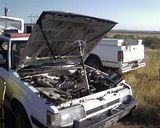Natfuelbilll
Senior Member
Does the NFPA 70E cover automotive ignition voltage; and do the mechanics need to wear voltage rated gloves?
Does the NFPA 70E cover automotive ignition voltage; and do the mechanics need to wear voltage rated gloves?
I am not sure there are gloves that would test to 80kv which is about open circuit voltage on a high energy ignition. I used 5kv pliers on them once with a cracked plug and I gotI am not asking about hybrid vehicles.
So are you saying that the mechanics need to wear Class 2 voltage rated gloves or stay 10" from the ignition wires?
I am not asking about hybrid vehicles.
So are you saying that the mechanics need to wear Class 2 voltage rated gloves or stay 10" from the ignition wires?
Yes they do
How big of a problem is this?
1910.333(a)(1)
"Deenergized parts." Live parts to which an employee may be exposed shall be deenergized before the employee works on or near them, unless the employer can demonstrate that deenergizing introduces additional or increased hazards or is infeasible due to equipment design or operational limitations. Live parts that operate at less than 50 volts to ground need not be deenergized if there will be no increased exposure to electrical burns or to explosion due to electric arcs.
Note 1: Examples of increased or additional hazards include interruption of life support equipment, deactivation of emergency alarm systems, shutdown of hazardous location ventilation equipment, or removal of illumination for an area.
Note 2: Examples of work that may be performed on or near energized circuit parts because of infeasibility due to equipment design or operational limitations include testing of electric circuits that can only be performed with the circuit energized and work on circuits that form an integral part of a continuous industrial process in a chemical plant that would otherwise need to be completely shut down in order to permit work on one circuit or piece of equipment.
Note 3: Work on or near deenergized parts is covered by paragraph (b) of this section.
NFPA 70e Table 130.2(C) for Nominal System Voltage range of 15.1kV to 36kV row and Prohibited Approach Boundary column.
you can't cross the PAB even with gloves on.
??
Prohibited Approach Boundary: Distance from an exposed live part within which work is considered the same as making contact with the live part. This boundary may only be crossed by a qualified person who has specific training to work on energized parts; has obtained an approved Energized Electrical Work Permit; and uses PPE appropriate for working on energized parts which are rated for the voltage and energy level involved. (Note: A permit is not required for work related to testing, troubleshooting, and voltage measuring).
I'm not a mechanic either, but I work on cars every now and then.How big of a problem is this? Would you have to actually be holding onto the wires while someone else was cranking the ignition to get zapped? Who would do that?
I'm not a mechanic (or an electrician for that matter), but it seems a little weird. Any time I've replaced spark plugs and/or wires, I take the cables off of the battery. No battery = no shocky.

Common misconception in the old standard, the required training for crossing the PAB is detailed training that linemen get, it is a certification and is commonly refered to as bare hand work, the 2009 70E has a clearer explanation to this.
So I think you are saying even after shock/arc/ppe/hazardanalysis/ewp/jobsafety meeting/...ad nauseum..http://forums.mikeholt.com/images/smilies/confused.gif. that touching the energized conductor, or passing through the PAB, is still not in accordance with 70E?
...
Sometimes, you will get a nice zap from the spark plug wire ....
Does 70E prohibit touching the insulated spark plug wire - with, or without, voltage rated gloves?
That wouldn't make any difference to me; I get shocked if I look at spark-plug wires the wrong way.Wait a minute - the actual conductor remains insulated.
